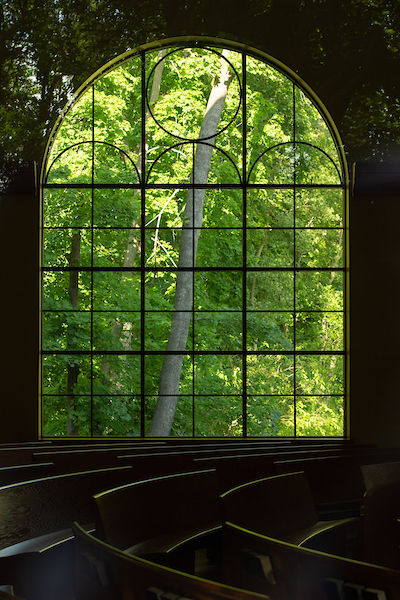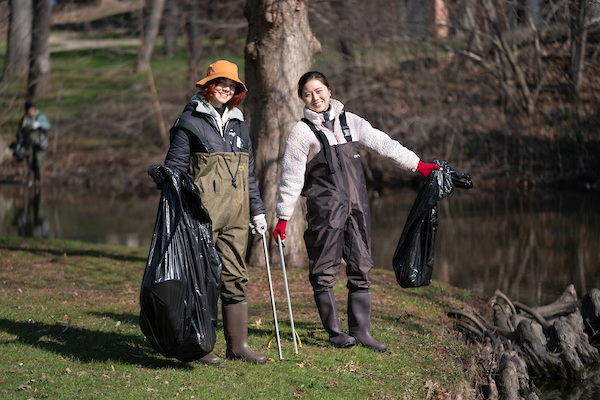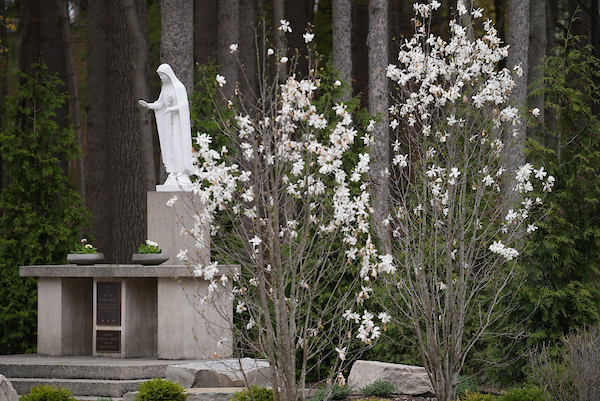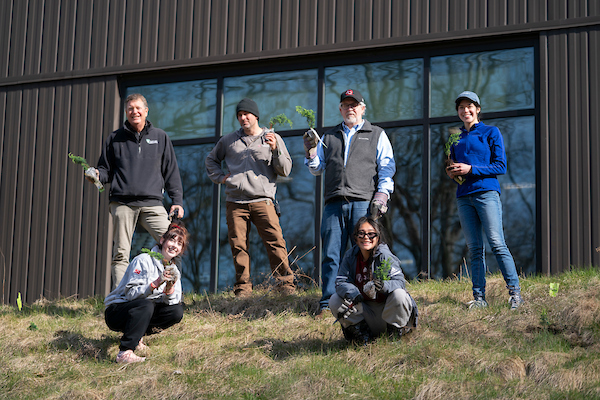Aquinas College is preparing for a year of planning after signing onto the Laudato Si’ Action Platform last year. The planning will result in a seven-year road map that will guide the college, which already has an advanced and highly regarded sustainability program, towards an even more sustainable future of care for the earth and humanity.
What is Laudato Si’ and the Laudato Si’ Action Platform?
 Laudato Si’ is a papal encyclical written by Pope Francis in 2015. With the subheading,
“On Care for our Common Home,” the encyclical calls on all of us to reevaluate our
relationship with the natural world and one another. Laudato Si’ is notably addressed
to “all people of our common home” (3), whereas historically, encyclicals address
bishops and churches.
Laudato Si’ is a papal encyclical written by Pope Francis in 2015. With the subheading,
“On Care for our Common Home,” the encyclical calls on all of us to reevaluate our
relationship with the natural world and one another. Laudato Si’ is notably addressed
to “all people of our common home” (3), whereas historically, encyclicals address
bishops and churches.
In Laudato Si’, Pope Francis speaks to the human causes of environmental degradation, the urgent need for action and highlights the inseparable ties between sustainability and social justice, a concept called Integral Ecology.
“Nature cannot be regarded as something separate from ourselves or as a mere setting in which we live,” writes Pope Francis. “We are part of nature, included in it and thus in constant interaction with it. Recognizing the reasons why a given area is polluted requires a study of the workings of society, its economy, its behaviour patterns, and the ways it grasps reality” (139).
Laudato Si’ presents all of us with seven goals: Response to the Cry of the Earth, Response to the Cry of the Poor, Ecological Economics, Adoption of Simple Lifestyles, Ecological Education, Ecological Spirituality, Emphasis on Community Involvement and Participatory Action. These goals inform the Laudato Si’ Action Platform, something Sister Damien Marie Savino, O.P., Dean of the College of Science and Sustainability, has closely reviewed in addition to the encyclical.
“The Church has said to all institutions all across the world, put yourself on a seven-year path toward putting care for creation into practice, because sometimes there’s a lot of talking and less doing,” said Sister Damien, FSE, Ph.D.
Aquinas College signed onto the platform in 2022, joining a community of organizations and individuals spanning the entire world, even across faiths.
“It’s written to everyone,” said Jessica Eimer-Bowen, Director of the Center of Sustainability since 2005. “I have a colleague who works at Brigham Young, which is a Mormon institution, and they are using Laudato Si’.”
Each organization that signs onto the Laudato Si’ Action Platform engages in a year of planning to assess what is being done for the care of our common home in their community, where improvements can be made, and what a road map might look like for a seven-year action plan. As Eimer-Bowen puts it, the plan at Aquinas must be “authentically us.”
Laudato Si’ at Aquinas College: Sustainability is in our DNA
Sustainability has been a priority on campus long before Laudato Si’ was issued. The Center for Sustainability at Aquinas College was one of the first established sustainability departments among colleges and universities in the country and is now a mature program. Aquinas’ zero-waste initiative is ranked seventh in the nation among colleges and universities. They also have a fully-fledged urban forest initiative which has inspired projects that brought goats to campus to sustainably manage overgrowth, protected and documented campus trees, and developed hammock guidelines, all of which support our thriving woodlands.

The ideas in Laudato Si’ deeply resonated with the Aquinas community. As a Catholic and Dominican college, many students, faculty and staff feel called to do this work of caring for our common home on the basis of their faith.
“We’re a Dominican School and a Catholic school,” said Sister Damien. “We now have a guiding document to help us in our efforts to care for creation.”
Both Sister Damien and Jessica Eimer Bowen pointed to the concept of integral ecology as a core concept of Laudato Si’ that they’re excited to reflect and act on. A concept articulated beautifully by The Center for Sustainability’s summer intern, Ella Satterthwaite: “It’s respecting the environment because you respect the people that you share it with.”
“We haven’t been through a planning process in a while for sustainability,” said Eimer-Bowen. “I think this is a cool opportunity for us to take a look at where we are, what we’ve done well and what we need, and what we need to do better for the next seven years with this new lens of people and human dignity. I think it’s exciting.”
Looking Towards a More Sustainable Future at AQ
In the 2023-2024 academic year, the focus will be on strategic planning. In addition to the Sustainability Initiatives already in place, the Aquinas College community will be reflecting on their sustainability efforts, assessing campus needs as they apply to the seven goals of Laudato Si’, and solidifying a vision for the next seven years.
 A steering committee of key contributors will be assembled and all voices are invited
to the table. President Alicia R. Córdoba, DMA, hopes the whole campus can get involved
in the process. “You cannot be successful with sustainability if you’re not doing
it in community,” she said. “It must be present through all levels of the institution
to work.”
A steering committee of key contributors will be assembled and all voices are invited
to the table. President Alicia R. Córdoba, DMA, hopes the whole campus can get involved
in the process. “You cannot be successful with sustainability if you’re not doing
it in community,” she said. “It must be present through all levels of the institution
to work.”
To get involved, the Center for Sustainability can be reached via email or in person.
Jessica Eimer-Bowen’s email is eimerjes@aquinas.edu and the Center for Sustainability is located in Albertus Magnus Hall in Room 129.
You can also visit the Laudato Si' page, which will be updated as planning continues.
“We are looking for excited passionate people who are looking to join the steering committee we’re also going to need a lot of hands on deck for making the seven-year plan and implementing our ideas,” said Eimer-Bowen. “It’s a good opportunity for the Community at Aquinas to come together around something that unifies us with the whole world.”
Ella Satterthwaite agrees. “Laudato Si’ emphasizes the humanity of people and it emphasizes the beauty of nature. These are things we can all agree on even if we aren’t religious,” she said. “I think everyone should be excited to learn more about this and how they can help the environment and by extension other people.”
